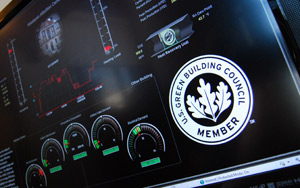Wesleyan to Gauge Sustainability Efforts with Assessment System

Recognizing the importance of sustainability and commitments set forth in the American College and University Presidents’ Climate Commitment (ACUPCC), Wesleyan has become a member of the Association for the Advancement of Sustainability in Higher Education (AASHE). AASHE is a national organization that enables higher education institutions to meet their sustainability goals by providing specialized resources, professional development, and a network of peer support. Wesleyan also has become a charter participant in AASHE’s Sustainability Tracking, Assessment & Rating System (STARS).
Created by the higher education community, STARS is a comprehensive system that enables colleges and universities to gauge their progress toward sustainability. It integrates efforts across campus, ranging from curriculum and research to operations and administration. More than 250 institutions in Canada and the United States are now participating in this innovative program. Institutions earn a STARS rating after a year of self-assessment, which involves collecting and publicly reporting information related to sustainability performance.
Since 2007, Wesleyan’ carbon emissions have dropped nearly 20 percent through the work of the Sustainability Advisory Group (SAGES), staff, faculty and students.
“Our efforts, large and small, have ranged from replacement of incandescent light bulbs, use of virtual servers, and installation of solar arrays to the construction of our natural gas co-generation plant and LEED building renovations,” Wesleyan President Michael Roth explained in a campus-wide e-mail on Oct. 24. “Much of our campus fleet of vehicles now uses electric, hybrid, or other energy-efficient sources of power. Students have led the ‘Do It In the Dark‘ energy competition, residential composting, local food production and sustainable landscaping projects.”
In July 2012, Wesleyan hired its first sustainability coordinator, Jen Kleindienst, to further these efforts and facilitate connections among students, faculty, staff and administrators.
With STARS, the university will be able to quantify its progress more effectively and chart the next steps. Wesleyan’s participation in STARS will require a substantial amount of data collection in three main categories: education and research; operations; and planning, administration and engagement. Wesleyan’s Sustainability Office, in partnership with SAGES, will be leading the data collection process for STARS over the next 12 months.
President Roth invites the Wesleyan community to participate in campus sustainability efforts and assist in the STARS data collection process.
“The success of STARS and sustainability at Wesleyan depends on your input and collaboration,” he said.
For more information on STARS, membership in AASHE or to get involved in sustainability projects, e-mail Jen Kleindienst at jkleindienst@wesleyan.edu or call 860-685-3242.

